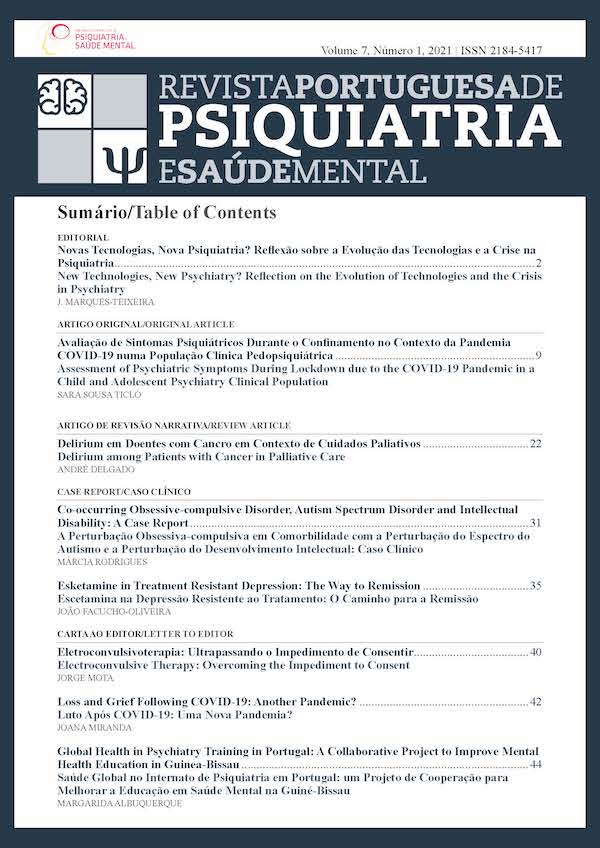Esketamine in Treatment Resistant Depression: The Way to Remission
DOI:
https://doi.org/10.51338/rppsm.2021.v.i1.174Keywords:
Antidepressive Agents, Depressive Disorder, Major/drug therapy, Depressive Disorder, Treatment‑Resistant/ drug therapy, Esketamine/administration & dosageAbstract
Major depressive disorder affects an estimate of 5% of the population with nearly 1‑third of patients failing to achieve remission with conventional pharmacological treatment. Esketamine, a novel rapid‑acting antidepressant, with a noncompetitive antagonism on N‑methyl‑D‑Aspartate receptor, have been recently approved by Food and Drug Administration (FDA) and European Medicines Agency (EMA) for treatment‑resistant depression. Here, we report a clinical case of a 42‑year‑old Caucasian woman who endured many years with severe depressive symptoms and high functional impairment. Previous treatments included cognitive behavioral therapy, numerous pharmacological trials with antidepressants and augmentation agents, and neurostimulation approaches. Upon treatment with esketamine, the patient presented remarkable clinical recovery. Psychometric assessments determined an acute reduction on the MADRS score after 1 week and progressive recovery of the depressive symptoms on the following weeks. Likewise, PHQ‑9 scale assessments, evaluating the relative frequency of depressive symptoms. and the Sheehan scale, assessing functional recovery, also determined a pronounced symptomatic relief.
Downloads
References
World Health Organization. The global burden of disease: 2004 update. Geneva, Switzerland: WHO; 2008. [accessed Nov 2020] Available from: https://www.fda.gov/NewsEvents/Testimony/
Baldessarini RJ, Forte A, Selle V, Sim K, Tondo L, Undurraga J, et al. Morbidity in depressive disorders. Psychother Psychosom. 2017; 86:65–72. doi: 10.1159/000448661.
Kessler RC, Berglund P, Demler O, Jin R, Merikangas KR, Walters EE. Lifetime prevalence and age‑of‑onset distributions of DSM‑IV disorders in the National Comorbidity Survey Replication. Arch Gen Psychiatry. 2005; 62: 593‑602. doi: 10.1001/archpsyc.62.6.593.
Kirsch I, Deacon BJ, Huedo‑Medina TB, Scoboria A, Moore TJ, Johnson BT. Initial severity and antidepressant benefits: a meta‑analysis of data submitted to the Food and Drug Administration. PLoS Med. 2008; 5: e45. doi: 10.1371/journal.pmed.0050045.
Agency for Healthcare Research and Quality. Definition of treatment‑resistant depression in the Medicare population. accessed Nov 2020] Available from: https://www.ahrq.gov/sites/ default/files/wysiwyg/research/findings/ta/draftsfor‑review/trd‑draft.pdf.
Rush AJ, Trivedi MH, Wisniewski SR, Nierenberg AA, Stewart JW, Warden D, et al. Acute and longer‑term outcomes in depressed outpatients requiring one or several treatment steps: a STAR*D report. Am J Psychiatry. 2006; 163:1905–17.
Berlim MT, Turecki G. Definition, assessment, and staging of treatment‑resistant refractory major depression: a review of current concepts and methods. Can J Psychiatry. 2007; 52: 46‑54.
Kim J, Farchione T, Potter A, Chen Q, Temple R. Esketamine for treatment‑resistant depression ‑ first FDA‑approved antidepressant in a new class. N Engl J Med. 2019; 381:1–4. doi: 10.1056/NEJMp1903305.
Zarkowski P, Navarro R, Pavlicova M, George MS, Avery D. The effect of daily prefrontal repetitive transcranial magnetic stimulation over several weeks on resting motor threshold. Brain Stimul. 2009; 2: 163–67.
Patil S. Early access programs: Benefits, challenges, and key considerations for successful implementation. Perspect Clin Res. 2016; 7: 4–8. doi: 10.4103/2229‑3485.173779.
Montgomery SA, Asberg M. A new depression scale designed to be sensitive to change. Br J of Psychiatry. 1979; 134: 382–89.
Leon AC, Olfson M, Portera L, Farber L, Sheehan DV. Assessing psychiatric impairment in primary care with the Sheehan Disability Scale. Int J Psychiatry Med. 1997; 27:93–105.
Spitzer RL, Kroenke K,Williams JB. Validation and utility of a self‑report version of PRIME‑MD: the PHQ Primary Care Study. JAMA. 1999; 282:1737–1744.
Daly EJ, Singh JB, Fedgchin M, Cooper K, Lim P, Shelton RC, et al. Efficacy and of intranasal esketamine adjunctive to oral antidepressant therapy in treatment‑ resistant depression: a randomized clinical trial. JAMA Psychiatry. 2018; 75:139–48. doi: 10.1001/jamapsychiatry.2017.3739.
Canuso CM, Singh JB, Fedgchin M, Alphs L, Lane R, Lim P, et al. Efficacy and safety of intranasal esketamine for the rapid reduction of symptoms of depression and suicidality in patients at imminent risk for suicide: results of a double‑blind, randomized, placebo‑controlled study. Am J Psychiatry. 2018; 175:620–30. doi: 10.1176/appi.ajp.2018.17060720.
Popova V, Daly EJ, Trivedi M, Cooper K, Lane R, Lim P, et al. Efficacy and safety of flexibly‑dosed esketamine nasal spray combined with a new oral antidepressant in treatment‑resistant depression: results of a randomized, double‑blind, active‑controlled study. Am J Psychiatry. 2019; 176:428–38. doi: 10.1176/appi.ajp.2019.19020172.
Daly EJ, Trivedi MH, Janik A, Li H, Zhang Y, Li X, et al. Efficacy of esketamine nasal spray plus oral antidepressant treatment for relapse prevention in patients with treatment‑resistant depression. A randomized clinical trial (SUSTAIN‑1). JAMA Psychiatry. 2019; 76:893‑903. doi: 10.1001/jamapsychiatry.2019.1189.








